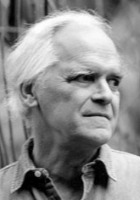At The Door Poem by David Wagoner
At The Door
All actors look for them-the defining moments
When what a character does is what he is.
The script may say, He goes to the door
And exits or She goes out the door stage left.
But you see your fingers touching the doorknob,
Closing around it, turning it
As if by themselves. The latch slides
Out of the strike-plate, the door swings on its hinges,
And you're about to take that step
Over the threshold into a different light.
For the audience, you may simply be
Disappearing from the scene, yet in those few seconds
You can reach for the knob as the last object on earth
You wanted to touch. Or you can take it
Warmly like the hand your father offered
Once in forgiveness and afterward
Kept to himself.
Or you can stand there briefly, as bewildered
As by the door of a walk-in time-lock safe,
Stand there and stare
At the whole concept of shutness, like a rat
Whose maze has been rebaffled overnight,
Stand still and quiver, unable to turn
Around or go left or right.
Or you can grasp it with a sly, soundless discretion,
Open it inch by inch, testing each fraction
Of torque on the spindles, on tiptoe
Slip yourself through the upright slot
And press the lock-stile silently
Back into its frame.
Or you can use your shoulder
Or the hard heel of your shoe
And a leg-thrust to break it open.
Or you can approach the door as if accustomed
To having all barriers open by themselves.
You can wrench aside
This unauthorized interruption of your progress
And then leave it ajar
For others to do with as they may see fit.
Or you can stand at ease
And give the impression you can see through
This door or any door and have no need
To take your physical self to the other side.
Or you can turn the knob as if at last
Nothing could please you more, your body language
Filled with expectations of joy at where you're going,
Holding yourself momentarily in the posture
Of an awestruck pilgrim at the gate-though you know
You'll only be stepping out against the scrim
Or a wobbly flat daubed with a landscape,
A scribble of leaves, a hint of flowers,
The bare suggestion of a garden.
Research Options Fields Apart well defined stimulus material is catalysis in raising questions... implying myriad possibilities when exiting chosen doors we close exit alternative routes... variant research choices fruitful lines further inquiries leading into other life fields... Copyright © Terence George Craddock Written in May 2015 on the 14.5.2015.9 aaa aaa aaa Inspired by a comment I made upon the poem 'At The Door' by David Wagoner, in November 2014 on the 10.11.2014. Dedicated to David Wagoner.
Decision Making Finale leave taking implies decision making finale from subtle to radical from trivial to incredible... with life implications set ranging throughout entire possible spectrums potent human experiences... doors swift slow opened closed defined... in consequence raising questions implying myriad possibilities when time entering exiting doors... Copyright © Terence George Craddock Inspired by the poem 'At The Door' by David Wagoner.
If only this rhymed, then it would be good poetry! I like the paragraph that talks about pretending to see through the door and pretending that you dont need it. Speaks of independence and strength but yet gives all the options in the poem. The idea is good and relatable, but the beginning lacks substance to draw you in and the absence of rhyming puts it at a lower level than it deserves.
Interesting but I believe good poetry need not rhyme, superior intensity may be obtained omitting inferior overdone rhymes.
For in that fleeting moment, eternity resides, And life unfurls its petals, one door at a time.
At the door, I become more than flesh and bone. Will I step out into the unknown, Embrace the sunlight's warm caress, Or linger in the shadows, safe but stagnant? The door whispers secrets, its grain a map of destiny.and bone, I am courage, curiosity, and wonder.
TOP Marks an amazing poem which need and deserve our attention. Great poem about the stage-door
it was a big event for me, it was a real crossing of a threshold, a real change of consciousness. Nothing was ever the same again.' Very important part in his life
This poem has not been translated into any other language yet.
I would like to translate this poem
Well defined in raising questions implying myriad possibilities when exiting doors.